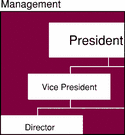
The idea of using managers as foremen and supervisors worked so well for the transportation companies that by the 1840s these companies employed managers at progressively higher levels. Such titles as vice-president, general manager, general freight agent, and general passenger agent were added. Meanwhile, enterprises owned by such families as the Mellons, DuPonts, McCormicks, and Rockefellers were expanding. They also required the services of managers to carry out the responsibilities of their growing corporations. Until the 20th century, management, in one form or another, was practiced but not thought about. One historian suggests that this lack of thought or writing throughout the Industrial Revolution reflects the lack of recognition of management as a technology or learnable set of skills.
There are three reasons for this:
1. It was difficult to isolate the actual managerial function and distinguish it from the technical and the financial function. Entrepreneurs performed a mixture of financial, technical, and managerial duties. Financial and technical considerations were considered the important functions. No one gave much thought to the problems of fitting together all of the other business functions, which is a major part of management today.
2. An organization’s performance was thought to be a direct result of the personality traits of its founder/leader. This period in time we dominated by a group of dynamic “founder managers”. It was assumed that their personal qualities, rather than their managerial skills, were responsible for their organization’s success.
3. Workers weren’t regarded as a resource little, if any, thought was given to the idea of adapting the work to the worker. The prevalent idea was to transform the worker into an obedient servant of the organization. Despite these conditions, a body of literature began to take shape early in the 20th century. This literature originally emphasized tasks, then people, until finally it focused upon management principles.
There are writings of the early management researchers’ Frederick W. Taylor, Henry Gantt, Frank and Lilllan Gilbreth, Elton Mayo, and Henri Fayol. It’s important to note that these researchers each approached their study of management from a particular background. Mayo, for example, was a psychologist; his research focused on the psychological aspects of work. In contrast, Taylor was an engineer, and his study was concerned with the physical aspects of performing work. All of these researchers had the same objective, but approached it from a different viewpoint. The first group of researchers thought of management as a science that could be learned.




sir i read your post, im a business ad student, im a 4thyr. student of the Management Department of the College of Business Administration and Accountancy in MINDANAO STATE UNIVERSITY,
can i ask the ff:
1.)how did other business ad courses came into taught since management was the core in the business
2.)what is the history of business ad courses here in the Philippines?
im currently taking up my Thesis
i need resources, much help if you could lend me…
more power sir!
@Mikhaille S. Baunto
Sorry my knowledge is very limited regarding Business Administration. Try searching Wikipedia.